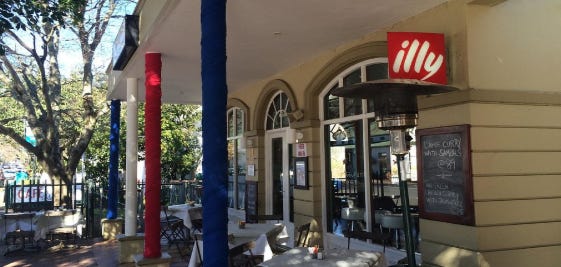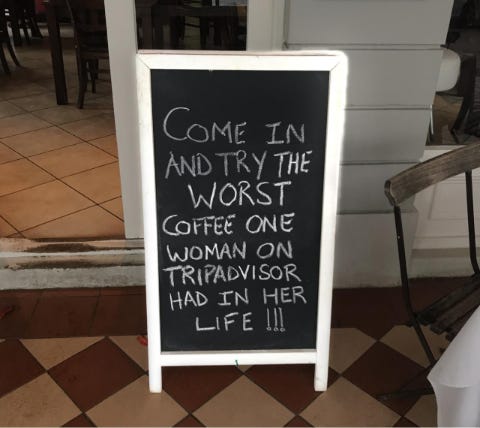podcast
Back in the mid-2000’s, I had the idea of starting a literary festival in the Cape. The question was to decide where might suit it best? So I got into my car and drove around attractive towns in the Western Cape. Franschhoek was walkable, its wines good and its location, cupped in the palm of a handful of blue mountains, instantly inviting.
The Franschhoek Literary Festival opened in 2006, on a hectic winter weekend in mid-May. Franschhoek found itself over-run by novelists, biographers, poets, publishers and journalists, from home and abroad. What it lacked was a good café .
A year later, halfway down the high street, a new café called Essence, opened on Huguenot Square. I stopped for coffee one morning and met its owner, an amiable man named Tim.
Essence Café Huguenot Square Franschhoek
The FLF was in its infancy and, in the opinion of many, it was unlikely to survive long. After all, as Tim gently pointed out, Franschhoek was already pretty festive. It celebrated its wines, promoted its cooking and each year, on Bastille Day, feted the 17th-century French settlers who gave the town its name. Adding a scrimmage of writers, and doing it in the Cape mid-winter, Tim observed, might be one festival too many. But he reckoned it was worth a try. Tim was from Johannesburg and did not scare easily.
It is a lucky literary festival that finds its own literary café. During the Franschhoek Festival’s first four years, when I was director, Essence provided an oasis of calm and very good coffee to writers of every stripe. That takes some doing. Writers en masse may be prickly or pleasant but they are seldom clubbable and as hard to herd as cats. Bring them together over a weekend in a small town, in a country as fractious as South Africa, and you can expect explosions. ‘Writers,’ Tennessee Williams once observed, ‘are cruel to tomcats but kind to kittens.’ In my experience, the opposite is also true. When writers fall out, some will happily spread the news; others take notes, and you can be sure of reading all about it. But Tim seemed able to hover above the fray of the day.
Tim understood, even liked, writers and saw them as interestingly different, often odd, sometimes very funny people. A good café may be several contradictory things at once. A place for meeting likeable and familiar company, or even an escape route. When a scandal broke or quarrels erupted, Tim would usher me out of the room, onto the narrow, little-used deck running down one side of the café. On the furthest table, there awaited a cup of fresh coffee. In Essence, coffee and decent cooking were matters of honour. When a customer posted on TripAdvisor a lousy review of his coffee, Tim chalked his response on a blackboard, propped it at the door of his café, and his riposte went viral. It was excellent advertising.
Essence became an extension of the Franschhoek Literary Festival . I believe it had what that connoisseur of literary cafés, Gerard-George Lemaire , in his great compendium of such happy places, defined as their essential attraction : ‘the right cafe possesses, at one time or another, a magnetic field attracting to its heart painters and poets, playwrights and architects, thinkers and novelists. It is a crucible of knowledge and creativity ...’
This looks like an over-large claim to make for any café (it sounds even grander in French). I think Essence cleared that bar. For the writers who found their way through its doors, the café served as a stage, an office, an essential waterhole, a confessional and a hide-out.
In 2016, when the FLF celebrated its tenth anniversary, Essence could no longer hold all the guests, and the celebration moved to the town hall. Tim did the catering that evening, as he had done from the beginning, at so many jamborees. A discreet, reassuring presence, he seemed to levitate above the crowd. I remember that evening so very clearly but I do so for a very unhappy reason. It was to be the last time I saw him. Tim died too soon, and too sadly, some years later.
I think Gerard-George Lemaire is right when he sums up the magic of a good literary café. Yet it’s worth noting that his remarks carry a warning. The magic is there only at one time or another. Sooner or later, it will be gone. The photo of Essence I use in this pen-picture is one I found on the internet. I liked it because it shows the café exactly as it looked in its heyday, sporting its French racing colours, red, white and blue. It freezes Essence in a moment of time, just as I remember it, and I find it very moving. But it also tells me, just as precisely and finally, that Essence is no more.
It was only later, looking more carefully at the photograph, that I noticed Tim had chalked the day’s lunch menu on the blackboard beside the door. It was lamb curry – or Thai chicken. The cooking at Essence summed up what was best about the café: unfussy, modest and good for the heart.
There is a moment in his autobiography, ‘Speak Memory’, when Vladimir Nabokov, after many decades in American exile, finds he still remembers his home phone number in long-lost St. Petersburg. If he dials the number, he wonders, will someone in his old home answer the phone? Looking at the lunch menu on the board outside Essence, I can smell that curry and wish I could book a table.
Christopher Hope
All the earlier cafés are in the archive and can be found at
https://christopherhope.substack.com/archive






